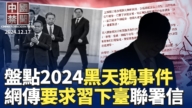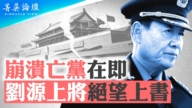【新唐人2012年8月17日讯】中国一发生重大事件或重大话题,中共机关报《人民日报》就立即刊发“本报评论员”的署名文章,予以解读和评论,引导舆论,这些神秘的评论员名字背后,蕴藏着独特的政治密码。但是,学者认为,虽然中共喉舌还时不时的根据形势,要引导舆论,可是人们已经觉醒,中共媒体的评论文章起不到多大作用了。
中共执政至今,重大决策通常在第一时间通过《人民日报》传播到全国。而《人民日报》的评论也有绝对的权威性,成为外国解读中国政治的风向标,也成为国内各界判断时局的重要参考。
香港《大公网》8月15号,对《人民日报》评论文章作者的“笔名”做了研究和解读,分析出:一般针对重大事件或者重大话题,多署名“本报评论员”。主要是根据谐音取笔名,比较著名的像“任仲平”,就是“ 人民日报重要评论”的谐音;而“国纪平”则是“国际重要评论”;“钟声”为 “中国之声”的谐音缩写;“仲祖文”是“中共中央组织部文章”的意思。
另外,在一些关键的历史节点前后,也有使用特殊笔名的文章出现,如曾经在90年代初蜚声国内外的“皇甫平”。“皇甫平”——实际是“在黄浦江辅佐邓小平”的意思。这个笔名为邓小平的观点摇旗呐喊,他的观点也引起了广泛的讨论和论战。
《北京之春》杂志主编胡平:“把它分类就是,一种就是真正的笔名,什么‘皇甫平’就是笔名。一种就是什么评论员,评论员、特别评论员都是笔名吗。另外一种就是看上去像笔名,其实他是谐音,他就直截了当告诉他是哪个部门、哪个单位。”
胡平认为,中共评论文章中,具体作者是谁根本不重要,代表哪个单位才最重要。当然,以个人笔名发表文章的评论员,也是经过某一级授意的。
原《河北人民广播电台》编辑、大陆自由撰稿人朱欣欣认为,个人代表官方观点写评论文章更像是中共宣传的需要。但是,作者本人很胆虚,一般不敢使用自己的真名。
原《河北人民广播电台》编辑 朱欣欣: “以官方组织的名义发表文章这不方便,显得也很不正规,他又明白大家都懂得潜规则。 另一方面,说明官方还有一种很虚伪的需要,他又是要假扮成似乎有一个作者,又代表个人观点,实际上代表官方组织的一个观点。”
有时《人民日报》“评论员”,代表的级别更高。如2010年10月末,《人民日报》以“郑青原”笔名,连续刊发五篇评论,内容更涉及“政改”等敏感话题。有分析指出,“郑青原”取“正本清源”的谐音,这是比“仲祖文”、“任仲平”更高级别的谐音,是政治局级别的舆论导向。
大陆资深传媒人高瑜指出,中共非常重视宣传,毛泽东为引导舆论,为《人民日报》写过很多社论,“反右”时,还当过《人民日报》总编辑,向右派开火的很多文章就是他写的。《人民日报》在宣传中共的方针政策,起到了绝对的“喉舌”作用。
不过,高瑜认为,人们目前已经觉醒,“喉舌”已经起不到太大作用了,群众不仅不看,还在微博、博客等媒体上,对中共的宣传进行针锋相对的反驳。
大陆资深传媒人 高瑜5:20——5:52“(民众)整个和这些什么‘郑青原、任仲平’和这些对着干,所以,弄得他们现在是非常头疼,严管舆论!而且是…中央现在对整个的形势的分析,你别看表面是冠冕堂皇,实际上他们分析的是很严重的,国内外的形势他们认为都不利。”
高瑜表示,中共为应对危机,一是用武力控制社会群体事件,二是在意识形态控制老百姓不让讲话,时不时的发一些吓人的评论,但人们已经不怕了。
采访/朱智善 编辑/宋风 后制/肖颜
CCP’s Political Cypher of Pen Names
China’s major events or topics are always commented on
by the People’s Daily, an official mouthpiece of the Chinese Communist Party (CCP).
The paper’s commentaries are usually authored
by “The paper’s commentator,” guiding the public opinion.
The pen names of the People’s Daily’ review articles
hide CCP’s political cypher.
Scholars remarked that as the Chinese have awakened,
the CCP’s official commentaries no longer matter much.
The People’s Daily serves as the major media
that spreads the CCP’s key decisions across China.
Its’ commentaries are deemed a political weathervane
for the West to interpret China’s politics,
and important references for the Chinese
to judge the political situation.
On August 15, Hong Kong’s Takungpao.com analyzed
the “pen names" of the People’s Daily’s review articles.
It said, the commentaries on major events or major topics
are usually authored by “the paper’s commentator.”
His pen names are mainly homophones. Such as
“Ren Zhongping," a homophone of “the important review of the People’s Daily.”
“Guo Jiping,” “the critical review on international issue;"
“Zhong Sheng," the “Voice of China;"
“Zhong Zuwen,” “the article issued by the CCP’s
Central Committee Organization Department."
Some special pen names were related
to important historic events.
Like “Huang Fuping,” a well-known name in China
and abroad in the early 1990s.
It actually means,
“assisting Deng Xiaoping in Huangpu River.”
The penname advocated for Deng’s views,
having aroused extensive discussions and debates.
Hu Ping (chief editor, Beijing Spring magazine): “Its pen
name classification includes true pseudonyms like ‘Huang Fuping;’
commentators or special commentator; and homophone
pen name, which indicates the department that expresses the article’s view.”
Hu Ping said, for the CCP’s review articles,
the true author is beside the point.
Its importance lies in which department it represents.
Hu Ping disclosed that any commentary issued under
a pseudonym was actually requested by the authorities.
Zhu Xinxin, editor of Hebei People’s Radio Station, said that
pen names in official commentaries are more likely to meet the need of the CCP’s propaganda.
The author is generally timid,
and dare not use his real name.
Zhu Xinxin: “It’s not convenient and proper for the regime
to publish its views in the name of some official sector.
But it knows that the public understand the unspoken rules.
Also, this shows the hypocritical side of the authorities.
It pretends to have an author who expresses his personal
point of view, but actually he is a voice of the regime."
Sometimes the pen name of “commentator”
implies a higher ranking.
For example, in late October 2010, the People’s Daily
released five commentaries authored by “Zheng Qingyuan.”
The review articles talked about “political reform"
and other sensitive topics.
Analysts say that “Zheng Qingyuan” is a homophone
of “clearing up the origin," a higher-level than “Zhong Zuwen," and “Ren Zhongping.”
It was considered to represent
the view of the CCP’s Politburo.
China’s media veteran Gao Yu remarks that the CCP
attaches great importance to its propaganda.
Such as Mao Zedong, who wrote many editorials
for the People’s Daily to guide public opinion.
During the “anti-rightist" movement, Mao, then chief editor
of People’s Daily, wrote many articles attacking the rightists.
People’s Daily has absolutely served as “mouthpiece"
in propagating CCP’s principles and policies, adds Gao Yu.
Gao Yu says that the public in China has awakened now.
Thus the “mouthpiece" cannot do much any more.
The public not only refuses to read official newspapers,
but refutes the CCP’s views on the internet.
Gao Yu: “The views touted by these official critics
have been attacked (by the public,) so the authorities tightened control over the public opinion!
The official analyses of the situation looks high-sounding,
but very serious in fact.
They have realized the situation, at home and abroad,
is against them."
Gao Yu comments that the CCP uses violence to control
mass protests, and ideological control to muzzle people.
It also issues some threatening commentaries.
However, all these techniques are failing to scare the public.




























